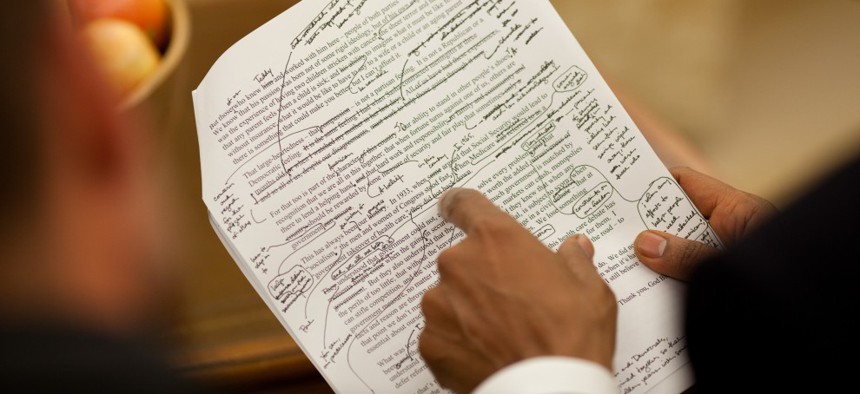
Words, words, words. President Obama reviews a 2009 speech on education. (White House)
The 9 Biggest Cliches in State of the Union Addresses
As Obama heads to the teleprompter, White House speechwriters spot the tired phrases he should avoid.
State of the Union addresses are rarely memorable, in part because they’re basically laundry lists of proposals combined with a memo about where the country stands. In fact, between Thomas Jefferson and William Howard Taft, presidents didn’t give a State of the Union speech. They just sent their assessment of the country’s condition up to Capitol Hill. Woodrow Wilson was the first to give an address. And the speech didn’t really become a big deal until Lyndon Johnson moved it from noon to prime time in 1965.
Despite its prominence, this most watched of speeches is usually littered with hack lines and bromides. “Let us,” “We must”, “The time is now,” and “The war on ... ” (drugs, cancer, terrorism, crime — take your pick). Herewith, the nine hackiest lines with an assist from former presidential speechwriters.
1. “Let us ... ” When I asked former Ronald Reagan speechwriter and Wall Street Journal columnist Peggy Noonan for hack phrases, she wrote me: “I vote for ‘Let us’ go forth, ‘Let us’ advance, ‘Let us’ move forward together. Hold the 'let us.' No one in normal language uses those words the way they are used now in formal speeches. Why not the less fancy, formal, and faux ‘My plan is’ or ‘The path we should take’ or 'I believe we should.' "
2. “Work hard and play by the rules.” This line had a certain resonance when Bill Clinton used it in his 1992 campaign, with its subtext of not coddling criminals in the underclass or corporate felons above. But by now it’s become a cliche in all of its usages whether it's used by George W. Bush or Barack Obama. Does the country really need more pandering to the middle class?
3. “God Bless America.” This last line of just about every speech only seems like it’s been part of our rhetoric forever, but Richard Nixon introduced it just 40 years ago and Ronald Reagan made it an automatic ending to pieces. It’s now stretched out to “God bless you and God bless the United States of America,” and over the last few years former Jimmy Carter speechwriter and Atlantic National Correspondent James Fallows has waged his own private war against the phrase — not because of the sentiment but because it’s a rote, cheap device that’s come to mean little more than “the speech is over." Count on hearing it tonight and as a reliable segue to pundit blather about whether the president did what he needed to do.
4. “Reach across the aisle ... ” No one outside of Washington ever uses this phrase, says former Carter speechwriter and Yahoo! columnist Walter Shapiro. He’s right. There are plenty of ways to tip one’s hat to the idea of parties working together without resorting to this cliche, especially since it’s wrong. At the speech, members can be found on both sides of aisles because there’s more than one.
5. “My fellow Americans ... ” A formal and sleep inducing opening, it got dings from two speechwriters I reached out to, Eli Attie, who wrote for Al Gore and is an acclaimed Hollywood producer with shows like The West Wing to his credit. Matt Latimer, who wrote for George W. Bush and is now at the Washington firm Javelin, cited it, too. And why not? It’s pure cliche and slightly pompous and redundant. I think Americans know you’re talking to them.
6. “Once again I call upon .. .” Shapiro notes that this trope is half plaintive. It means the president has asked for this before from Congress and he hasn’t gotten it. Seeming whiny isn’t going to change that. Just think of kids: “Once again I call upon you to release my Xbox.”
7. “Our children and our children’s children .. .” This is a particularly gassy way of saying “the future” and of invoking the next generation. But if you actually have children, the thought of them having children is not one you’re always eager to embrace.
8. “Courage and determination .. .” Rick Hertzberg, Carter speechwriter and New Yorker editor, cited this one to me. It’s an almost mindless invocation of qualities that people admire, but like “work hard and play by the rules” it’s been drained of any power by its constant invocation.
9. “These are not Democratic or Republican values. They’re American values ... ” Any time the not-parties-but-American construct is used it’s usually either completely banal, such as a salute to upward mobility, or its meant to cloak what is a partisan proposition, e.g., fighting any changes in Social Security.
So keep this in mind as you watch Obama’s speech. God bless you and God bless the United States of America.






